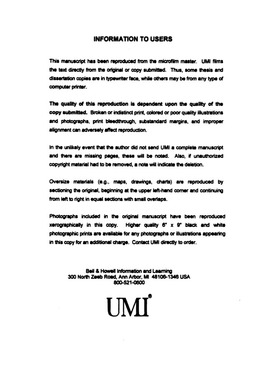| dc.contributor.advisor | Harris, Betty, | en_US |
| dc.contributor.author | Chesnut, W. Everett. | en_US |
| dc.date.accessioned | 2013-08-16T12:30:57Z | |
| dc.date.available | 2013-08-16T12:30:57Z | |
| dc.date.issued | 2000 | en_US |
| dc.identifier.uri | https://hdl.handle.net/11244/5985 | |
| dc.description.abstract | One of the difficulties faced by modern gender writers and scholars stems from the fact that modern conventions of what constitute valid modes of rhetoric and reasoning and valid scientific and scholarly paradigms were developed during a time when both women and so-called feminine attributes were excluded from intellectual participation and consideration. A number of feminists have argued that these conventional modes and paradigms embody patriarchal values and approaches, what Helene Cixous calls phallogocentrism, a mode which is grounded in the rationalist paradigm apotheosized by the Enlightenment in Europe. Phallogocentrism privileges the intellectual conceit of detached neutrality and so-called objectivity over an affective and subjective awareness of the human lifeworld; it privileges the totalizing impulse towards universal absolutes over the specific, particularizing approach which avoids ethnocentrism; and it privileges atomistic, analytic logic over holistic, associative or connective logic. Many feminists regard this exclusion of subjective experience, of emotions and the human lifeworld, and of associative or connective reasoning as simultaneously denying the modes through which women interact with reality and privileging the modes through which patriarchal men interact with reality. | en_US |
| dc.description.abstract | In response to these concerns, some gender scholars and writers have begun using a specific form of narrative discourse as an alternative epistemological and communicative mode to the phallogocentric mode. This particular mode has many labels; I have settled upon the label of subjective-narrative discourse. I have discovered that what allows subjective-narrative discourse to encompass ethos while avoiding ethnocentrism is that it utilizes folklore motifs; like most motifs in folklore, these folklore motifs may be imperceptible to both author and audience yet can be discerned and analyzed through the techniques of folklore studies. Subjective-narrative discourse involves the use of this particular form of narrative as a persuasive epistemological and communicative mode co-equal with phallogocentrism. In doing so, subjective-narrative discourse embodies the principles of some gender studies/movements. However, subjective-narrative discourse also deals in archetypal universals without ethnocentric totalizing and generalizing. | en_US |
| dc.format.extent | vii, 210 leaves ; | en_US |
| dc.subject | Discourse analysis, Literary. | en_US |
| dc.subject | Women's Studies. | en_US |
| dc.subject | Gender identity in literature. | en_US |
| dc.subject | Folk literature. | en_US |
| dc.subject | Folklore. | en_US |
| dc.subject | Discourse analysis, Narrative. | en_US |
| dc.subject | Language, Rhetoric and Composition. | en_US |
| dc.subject | Anthropology, Cultural. | en_US |
| dc.title | Folklore motifs in persuasive gender writings: An interrogation. | en_US |
| dc.type | Thesis | en_US |
| dc.thesis.degree | Ph.D. | en_US |
| dc.thesis.degreeDiscipline | Department of Anthropology | en_US |
| dc.note | Source: Dissertation Abstracts International, Volume: 61-06, Section: A, page: 2413. | en_US |
| dc.note | Chair: Betty Harris. | en_US |
| ou.identifier | (UMI)AAI9975788 | en_US |
| ou.group | College of Arts and Sciences::Department of Anthropology | |
